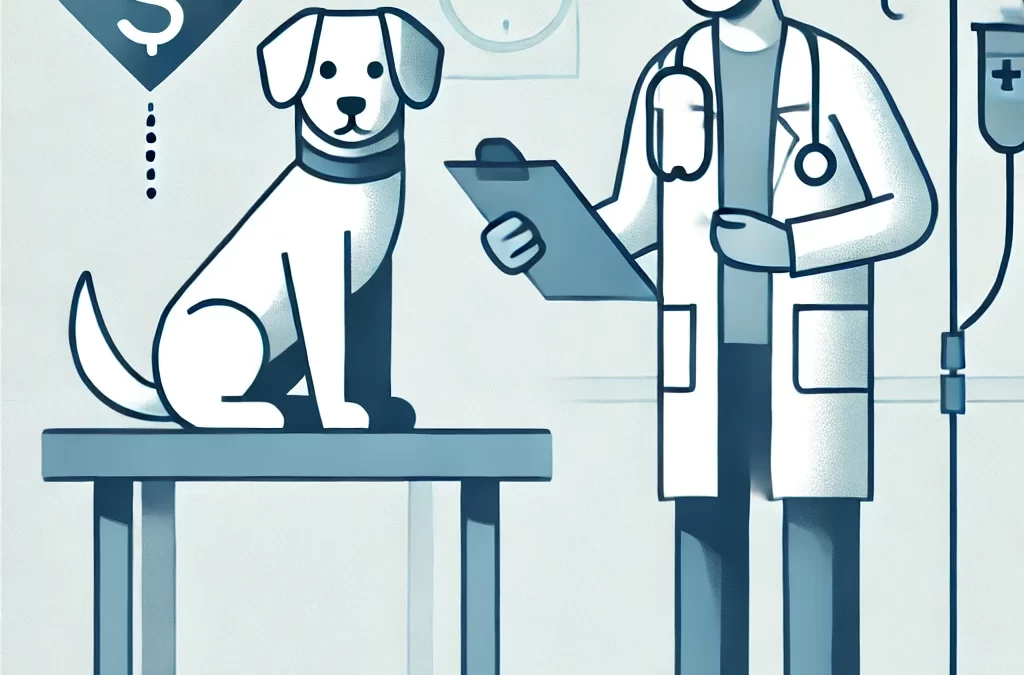
by TCMVET | Nov 26, 2024 | Dog Cancer & Tumors
When a pet parent hears the word “tumor,” it’s like a punch to the gut. The questions come flooding in: Is it cancerous? Will my dog be okay? And most importantly, what can I do to help? While modern veterinary medicine offers various treatments, many owners are turning to natural, holistic approaches to complement traditional care. Let’s explore some innovative and lesser-known options to help manage and potentially shrink tumors in dogs.
The Nature of Tumors in Dogs
Tumors in dogs can range from benign lipomas to malignant cancers like mast cell tumors or osteosarcomas. The treatment plan depends on the type, size, and stage of the tumor, but addressing it often involves a mix of conventional treatments (like surgery or chemotherapy) and supportive therapies to boost overall health.
But here’s the catch: not all treatments have to be invasive or synthetic. Nature has provided us with a treasure trove of resources that may help shrink tumors while supporting your dog’s well-being.
Nutritional Support: Food as Medicine
- Mushroom Powerhouses
Medicinal mushrooms like shiitake, reishi, and turkey tail are rich in beta-glucans, which can help regulate the immune system and may slow tumor growth. Studies in veterinary oncology suggest that these fungi can reduce the progression of certain cancers. A sprinkle of powdered mushroom supplements in your dog’s food could be a game-changer.
- Golden Paste (Turmeric Blend)
Turmeric is known for its active compound, curcumin, a powerful anti-inflammatory and antioxidant. Curcumin has been shown to disrupt cancer cell growth in some studies. Mix turmeric powder with coconut oil and black pepper to create a dog-friendly golden paste.
- Omega-3 Fatty Acids
Found in fish oil or flaxseed, omega-3s are natural anti-inflammatories that can slow the growth of tumors and support overall health. Add it to your dog’s meals for a simple yet impactful dietary boost.
Natural Supplements for Tumor Management
- CBD Oil
Cannabidiol (CBD) has gained traction for its potential anti-tumor effects. It’s believed to induce apoptosis (programmed cell death) in cancer cells and reduce inflammation. Always choose a pet-specific CBD oil that’s free from THC and consult your vet for the right dosage.
- Essiac Tea
A blend of herbs including burdock root, slippery elm, and sheep sorrel, Essiac tea has long been used as a natural remedy for tumors. It’s available in liquid or capsule form and is believed to help detoxify the body and shrink abnormal growths.
- Chuanxiong (Szechuan Lovage)
A lesser-known but potent traditional Chinese herb, Chuanxiong has properties that improve circulation and reduce inflammation. Some holistic vets recommend it as part of an herbal protocol for managing tumors.
Holistic Therapies
- Acupuncture
While not directly shrinking tumors, acupuncture can improve blood flow, reduce pain, and enhance the efficacy of other treatments. It’s a great addition to a multi-faceted care plan.
- Hyperbaric Oxygen Therapy (HBOT)
Tumors thrive in low-oxygen environments. Hyperbaric oxygen therapy saturates the body with oxygen, potentially slowing tumor growth and aiding in healing.
Lifestyle Adjustments
- Dietary Overhaul
A low-carb, high-protein diet can starve certain tumors that rely on sugar for growth. Consider a raw or cooked diet tailored to your dog’s specific needs.
- Stress Reduction
Chronic stress can suppress the immune system, making it harder for your dog to fight off diseases. Ensure your dog’s environment is calm and enriched with activities they enjoy.
- Detoxifying the Environment
Reduce exposure to harmful chemicals like pesticides, synthetic air fresheners, and processed foods. These environmental toxins can burden your dog’s system, making recovery more challenging.
The Power of Combining Modern and Natural Approaches
While natural therapies offer incredible benefits, they’re not a standalone solution for all dogs. Partnering with a vet who understands integrative care is crucial. This ensures your dog receives the best of both worlds: the life-saving power of modern medicine and the gentle support of natural remedies.
A Hopeful Outlook
The journey of helping your dog through a tumor diagnosis can feel daunting, but remember: you’re not alone. With a blend of dietary changes, natural supplements, and holistic therapies, you can give your dog a fighting chance while improving their quality of life.
Sometimes, the smallest changes—a dash of turmeric, a spoonful of mushroom powder, or a drop of CBD—can make the biggest difference.

by TCMVET | Nov 26, 2024 | Food & Health
As pet owners, we constantly search for ways to enhance our dogs’ well-being. While mainstream supplements like fish oil or glucosamine are widely used, one unique option gaining popularity is shiitake mushroom powder. This ancient superfood, traditionally revered in Asian cuisine and medicine, is making its way into the pet wellness world with promising benefits. Let’s delve into why shiitake mushroom powder might be the next game-changer for your furry friend.
What Is Shiitake Mushroom Powder?
Shiitake mushrooms (Lentinula edodes) are a type of edible fungus known for their rich umami flavor and potent health properties. When ground into a fine powder, this ingredient becomes a versatile supplement that can be easily added to your dog’s meals. Packed with essential nutrients like vitamins B and D, selenium, copper, and polysaccharides, shiitake mushrooms are much more than just a culinary delight.
The Surprising Health Benefits for Dogs
Shiitake mushroom powder isn’t just a trendy addition; it’s backed by science. Here are some ways it can improve your dog’s health:
- Immune System Support
Shiitake mushrooms contain beta-glucans, compounds known for their immune-boosting properties. These help strengthen your dog’s defenses against infections and diseases, making it especially beneficial for aging dogs or those with weakened immune systems.
- Anti-Inflammatory Properties
If your dog suffers from arthritis, allergies, or other chronic inflammatory conditions, the natural compounds in shiitake mushrooms can help reduce inflammation and promote comfort.
- Antioxidant Powerhouse
Rich in antioxidants like selenium, shiitake mushrooms combat oxidative stress in dogs, which can slow down aging and reduce the risk of chronic illnesses.
- Digestive Health
The prebiotic fibers in shiitake mushrooms support gut health by feeding beneficial bacteria, improving digestion, and helping with nutrient absorption.
- Cancer Prevention and Support
Shiitake mushroom powder is gaining attention for its potential anti-cancer properties, particularly due to compounds like lentinan. While not a cure, it can be a complementary therapy for dogs battling tumors.
How to Introduce Shiitake Mushroom Powder to Your Dog
- Start Small
Begin with a small amount (around 1/4 teaspoon for small dogs and 1/2 teaspoon for larger dogs) mixed into their food. Gradually increase as your dog adjusts.
- Choose High-Quality Powder
Ensure you’re using a product specifically formulated for pets. Organic, pesticide-free, and minimally processed powders are best.
- Observe and Adjust
Monitor your dog for any changes in digestion or behavior. While rare, some dogs may have sensitivities to mushrooms.
The Ethical Bonus: Sustainability
Using shiitake mushroom powder aligns with eco-friendly practices. Mushroom farming requires minimal water and land, making it a sustainable choice. As more pet owners embrace environmentally conscious lifestyles, adding shiitake powder to your dog’s diet can be a small step toward a greener future.
Breaking the Myths: Are Mushrooms Safe for Dogs?
Many pet owners hesitate when they hear “mushroom” due to concerns about toxicity. While it’s true that some wild mushrooms are dangerous, cultivated varieties like shiitake are perfectly safe for dogs when given in moderation. As always, consult your veterinarian before introducing any new supplement.
Shiitake Powder Recipes for Dogs
To make mealtime exciting, here are some simple ways to incorporate shiitake mushroom powder into your dog’s diet:
- Shiitake Sprinkle: Dust a pinch of powder over your dog’s regular kibble or wet food.
- Golden Paste: Mix shiitake powder with turmeric, coconut oil, and water for an anti-inflammatory boost.
- Homemade Treats: Bake dog biscuits using oat flour, peanut butter, and a teaspoon of shiitake powder.
Conclusion: A Superfood for Super Dogs
Shiitake mushroom powder is more than just a supplement; it’s a holistic approach to canine wellness. From boosting immunity to supporting gut health, its natural benefits can complement your dog’s diet in a way few other supplements can.
So why not step away from the ordinary and give this unique superfood a try? Your dog might just thank you with a wagging tail and a healthier life.
by TCMVET | Nov 25, 2024 | Food & Health
Polysaccharide peptides (PSPs), derived from medicinal mushrooms, have long been lauded for their remarkable health benefits in humans. Now, their potential as a groundbreaking supplement for canine health is gaining attention. Cellular PSP, a concentrated form of these powerful compounds, offers a holistic approach to boosting immunity, combating chronic diseases, and enhancing overall well-being in dogs.
What Is Cellular PSP?
Cellular PSP is a bioactive compound derived from medicinal mushrooms like Trametes versicolor (Turkey Tail) and Ganoderma lucidum (Reishi). It combines polysaccharides and peptides, which work synergistically to deliver immunomodulatory, anti-inflammatory, and antioxidant benefits. These properties make it a valuable addition to the health regimen of dogs dealing with chronic illnesses, cancer, or immune-related conditions.
How Cellular PSP Benefits Dogs
Immune System Support
Cellular PSP is a natural immune modulator, helping to regulate and strengthen your dog’s immune defenses. It’s particularly beneficial for dogs with:
- Cancer: By enhancing natural killer (NK) cell activity and stimulating white blood cells, it helps the body combat tumors.
- Chronic infections: Cellular PSP aids in fighting persistent infections by boosting immune response.
Anti-Cancer Properties
Studies on PSP have shown promising results in reducing tumor growth and improving survival rates. For dogs, this means:
- Slowing the progression of cancers like lymphoma, osteosarcoma, and mast cell tumors.
- Reducing the side effects of chemotherapy, such as fatigue and weakened immunity.
Anti-Inflammatory Effects
Chronic inflammation is a root cause of many diseases in dogs, including arthritis and gastrointestinal disorders. PSP reduces inflammation at the cellular level, providing relief from:
- Joint pain and stiffness.
- Digestive issues like inflammatory bowel disease (IBD).
Antioxidant Protection
Cellular PSP’s antioxidant properties neutralize free radicals, preventing cellular damage and supporting overall health. This is particularly valuable for aging dogs, as it helps mitigate the effects of oxidative stress, which can lead to age-related diseases.
Is Cellular PSP Right for Your Dog?
While the benefits of Cellular PSP are extensive, it’s essential to consult with a veterinarian before introducing it to your dog’s diet. Dogs with specific health conditions or undergoing chemotherapy may require tailored dosages for optimal results. Moreover, always choose PSP supplements from trusted sources to ensure purity and efficacy.
Conclusion
Cellular PSP represents a cutting-edge approach to canine wellness, bridging the gap between natural therapies and modern science. By supporting immunity, reducing inflammation, and providing antioxidant protection, this powerful supplement can enhance your dog’s quality of life. Whether used as a preventative measure or as part of a broader treatment plan, Cellular PSP offers hope and holistic healing for dogs of all ages.

by TCMVET | Nov 25, 2024 | Dog Cancer & Tumors
Osteosarcoma, a highly aggressive bone cancer, often strikes fear into the hearts of dog owners. Conventional treatments like amputation and chemotherapy, though common, can be financially and emotionally taxing. However, natural therapies are gaining traction for their potential to improve quality of life, alleviate symptoms, and support the body’s healing processes. Below, we delve into a variety of innovative natural treatments tailored to canine osteosarcoma.
Understanding Osteosarcoma in Dogs
Osteosarcoma typically affects large and giant breeds, targeting the limbs. It is characterized by rapid tumor growth and a high risk of metastasis to the lungs. Early detection and a multifaceted treatment approach can significantly enhance a dog’s quality of life.
Natural Treatments to Support Your Dog’s Journey
1. Herbal Remedies for Pain Management
Natural pain management can reduce reliance on pharmaceuticals, which often have side effects. Consider these herbs:
- Boswellia Serrata: Known for its anti-inflammatory properties, this resin reduces swelling and improves mobility.
- Turmeric (Curcumin): A potent anti-inflammatory and antioxidant, turmeric can ease joint discomfort and has been studied for its anti-cancer effects.
- Yunnan Baiyao: A Chinese herbal formula renowned for promoting blood circulation and relieving pain, especially in cases of bone-related injuries or cancer.
2. Dietary Strategies to Strengthen Immunity
Nutrition plays a pivotal role in supporting a dog’s immune system during cancer treatment. Focus on:
- High-Protein Diets: To maintain muscle mass and energy levels.
- Omega-3 Fatty Acids: Found in fish oil, these help reduce inflammation and may slow tumor growth.
- Low-Carbohydrate, High-Fat Meals: Cancer cells thrive on sugar, so ketogenic-style diets may limit tumor progression.
3. Cannabidiol (CBD) for Cancer Support
CBD oil derived from hemp is celebrated for its anti-inflammatory and anti-tumor properties. It helps:
- Reduce pain and anxiety.
- Improve appetite and energy levels.
- Potentially inhibit the growth of cancer cells, as shown in emerging studies.
When choosing CBD oil, ensure it is full-spectrum, organic, and free from THC.
4. Acupuncture and Traditional Chinese Medicine (TCM)
TCM treatments like acupuncture can complement other therapies by:
- Alleviating pain and improving blood circulation.
- Enhancing immune function.
- Restoring balance in the body’s energy (Qi).
Herbal formulas such as Baituxiao may specifically target tumor growth and enhance overall well-being. Always consult a veterinarian experienced in TCM to customize treatments for your dog.
5. Physical Therapy and Gentle Exercise
Post-surgery or as part of palliative care, physical therapy helps:
- Maintain mobility and prevent muscle atrophy.
- Boost mood and mental engagement. Activities like swimming or controlled walking can be particularly effective for dogs with limb amputation.
6. Homeopathic Approaches
Some pet owners explore homeopathic remedies, such as:
- Symphytum: Known as “bone knit,” this remedy may support bone healing.
- Hecla Lava: Used for bone conditions, including tumors and osteosarcoma.
Consult a homeopathic vet for proper guidance and dosage.
Case Study: A Natural Journey
Take the story of Bella, a 9-year-old Great Dane diagnosed with osteosarcoma. After her amputation, her owner supplemented conventional treatment with a high-protein, low-carb diet, CBD oil, and Boswellia extract. Regular acupuncture sessions improved Bella’s mobility and mood. The holistic approach not only prolonged her life but also ensured she lived with comfort and dignity.
Tips for Dog Owners Exploring Natural Treatments
- Work with a Holistic Veterinarian: Collaboration ensures therapies are safe and effective.
- Monitor Progress Closely: Regular check-ups and imaging help assess how treatments are working.
- Stay Open-Minded: Combining natural and conventional treatments often yields the best outcomes.
The Importance of Emotional Support
Caring for a dog with cancer can be emotionally draining. Building a support network of friends, family, and holistic veterinarians ensures you’re not alone on this journey.
Conclusion
Natural treatments for osteosarcoma in dogs focus on enhancing quality of life, alleviating pain, and supporting the immune system. By combining evidence-based natural therapies with traditional treatments, you can create a care plan that prioritizes your dog’s comfort and well-being. Remember, every dog is unique, and a tailored approach is key to success.
Your canine companion deserves a fighting chance—naturally.

by TCMVET | Nov 24, 2024 | Dog Cancer & Tumors
When a beloved pet is diagnosed with cancer, the emotional toll on their human companions is immense. But alongside the heartache comes another daunting reality: the cost of treatment. Pet cancer treatments can be life-saving but often carry a hefty price tag. So, what’s the real cost of giving your furry friend a fighting chance—and how do we measure the value of their life in dollars?
Breaking Down the Average Cost
The cost of pet cancer treatment varies significantly depending on factors such as the type of cancer, stage of diagnosis, treatment options, and location. Here’s a general breakdown:
- Diagnostics:
- X-rays, ultrasounds, biopsies, and blood tests can cost between $500 and $1,500. Advanced imaging like CT scans or MRIs can add another $1,000 to $2,500.
- Surgery:
- Surgical removal of a tumor often ranges from $1,000 to $5,000, depending on complexity and location.
- Chemotherapy:
- Chemotherapy protocols can cost between $3,000 and $10,000, depending on the number of sessions and drugs used.
- Radiation Therapy:
- This advanced treatment can range from $5,000 to $15,000, making it one of the priciest options.
- Palliative Care:
- If curative treatments aren’t viable, palliative care to manage symptoms can still cost $500 to $2,000.
Altogether, the average cost of treating pet cancer can fall anywhere between $5,000 and $20,000—and sometimes even higher. These figures are sobering, especially when weighed against a household budget.
The Emotional vs. Financial Cost
For many pet parents, the decision to pursue cancer treatment is not just financial but deeply emotional. Pets are family, and the idea of not doing everything possible to save them feels unbearable. Yet, the reality of veterinary oncology is that success is not guaranteed, and even aggressive treatments may only extend a pet’s life by months or a few years.
- Emotional Considerations:
The value of the time gained through treatment—whether weeks, months, or years—cannot be easily quantified. Many pet owners report that even a few extra months of quality time with their pets was worth every penny.
- Financial Strain:
However, the financial burden can lead to guilt and stress, especially when treatment costs interfere with household needs. It’s an unenviable position to be in: How do you say no when love is on the line?
Are There Ways to Reduce Costs?
Pet owners facing a cancer diagnosis should know that there are ways to manage and reduce treatment costs:
- Pet Insurance:
If purchased early, pet insurance can cover a significant portion of cancer treatment costs. However, pre-existing conditions are usually excluded.
- Nonprofit Organizations:
Several organizations provide financial assistance for pet medical care, particularly for cancer treatment.
- Holistic and Palliative Options:
For pets with a poor prognosis, holistic treatments such as CBD oil, acupuncture, or natural supplements may offer a more affordable way to improve quality of life.
- Clinical Trials:
Some veterinary institutions run clinical trials for new cancer treatments, often covering a portion of the costs.
- Discuss Options with Your Vet:
Many vets are willing to work with pet owners to develop a realistic and affordable treatment plan. Some clinics also offer payment plans.
Is It Worth It?
The question of whether the cost of pet cancer treatment is “worth it” is deeply personal. For some, the answer is a resounding yes—because no price is too high for love. For others, the decision to forgo treatment is not a sign of failure but an act of compassion, prioritizing the pet’s comfort and dignity over prolonging their life at any cost.
Redefining Value in Pet Cancer Care
Ultimately, the average cost of pet cancer treatment is not just a financial statistic but a reflection of the lengths we’ll go to for our furry companions. The journey is as much about hope, love, and resilience as it is about money. Whether choosing to pursue treatment or opting for palliative care, the decision should honor the bond you share with your pet and their quality of life.
As the field of veterinary oncology advances, perhaps one day we won’t have to measure our love in dollars. Until then, we do the best we can—with our hearts and wallets—to give our pets the lives they deserve.





